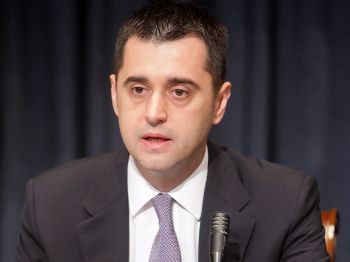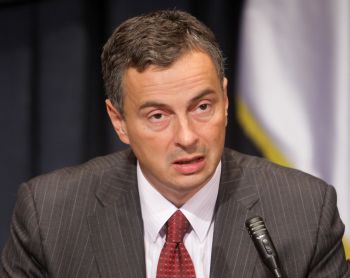Q:
A:
Agreement on new precautionary arrangement with IMF reached
Belgrade,
31 August 2011
State Secretary of Finance Dusan Nikezic said today that the Serbian government has reached an agreement on a new precautionary arrangement with the IMF, which will last 18 months and enable Serbia access to funds amounting to €1 billion.
Nikezic told a press conference that agreement has also been reached about budget revision for 2011 and frameworks for the 2012 budget, specifying that budget deficit in 2011 will be 4.5% of GDP and in 2012 4% of GDP.
The arrangement implies an increase in salaries and pensions in October and an increase in social payouts by around RSD 3.8 billion, Nikezic said. Projected budget revenue for 2011 will be lower than planned by RSD 22 billion. The largest increase in expenses will be caused by the envisaged rise in salaries and pensions, totalling RSD 13.4 billion, and social payouts, totalling RSD 3.8 billion, he added. The arrangement with the IMF is of utmost importance for Serbia because it is a signal that the government and the National Bank of Serbia will lead a responsible economic policy and secure macroeconomic stability in the next 18 months, he observed.
Nikezic added he expects the arrangement to have a positive impact on economic activities and increase employment and the standard of living.
The arrangement implies an increase in salaries and pensions in October and an increase in social payouts by around RSD 3.8 billion, Nikezic said. Projected budget revenue for 2011 will be lower than planned by RSD 22 billion. The largest increase in expenses will be caused by the envisaged rise in salaries and pensions, totalling RSD 13.4 billion, and social payouts, totalling RSD 3.8 billion, he added. The arrangement with the IMF is of utmost importance for Serbia because it is a signal that the government and the National Bank of Serbia will lead a responsible economic policy and secure macroeconomic stability in the next 18 months, he observed.
Nikezic added he expects the arrangement to have a positive impact on economic activities and increase employment and the standard of living.
Governor of the National Bank of Serbia (NBS) Dejan Soskic said that with the new precautionary arrangement, Serbia will improve its position at the international market and achieve a lower cost of financing its public debt.
He voiced his hope that Serbia’s risk premium will start to drop soon.
Following a new arrangement with the IMF, Serbia will appear on the international market with its fiscal credibility additionally verified, which is critical in a moment such as this one, because the new economic crisis has already been defined as a public debt crisis, one which affects the fiscal credibility of many countries.
I believe that in the period ahead we will show that we fully respect the principles of fiscal responsibility and that at the international market, we will be observed as a country capable of sufficiently settling its obligations, the Governor stressed.
Soskic said that previous NBS’s stances regarding fiscal policy have been affirmed in the talks with the IMF and that it was established that the planned frameworks should be retained, with a target inflation rate and a controlled fluctuating regime of the foreign currency exchange rate.
He voiced his expectation that just as the NBS predicted, the inflation rate will start declining in the third and fourth quarters of 2012, adding that official statistical data indicate that it has already started to drop.
We expect that by the end of the third quarter, the inflation rate will be single-digit, while early in 2012 it should be somewhere near the targeted 4.5%, with a variation of 1.5%, Soskic said.
Serbia’s financial stability was deemed favourable, and the central bank is in the process of adopting a new Basel 2 regulation in the banking sector which will more accurately measure risks in the banking system, the total level of liquidity and solvency, he observed.
Measures implemented with the aim of maintaining financial stabilityhave been assessed by the IMF as adequate, Soskic said, adding that the IMF endorsed dinarisation which the NBS has been implementing for some time, in agreement with the government.
The dinarisation mechanism should create a higher level of financial market stability in Serbia and lower sensitivity to fluctuations in the foreign currency exchange rate, including potential negative effects that may stem from there, Soskic concluded.
He voiced his hope that Serbia’s risk premium will start to drop soon.
Following a new arrangement with the IMF, Serbia will appear on the international market with its fiscal credibility additionally verified, which is critical in a moment such as this one, because the new economic crisis has already been defined as a public debt crisis, one which affects the fiscal credibility of many countries.
I believe that in the period ahead we will show that we fully respect the principles of fiscal responsibility and that at the international market, we will be observed as a country capable of sufficiently settling its obligations, the Governor stressed.
Soskic said that previous NBS’s stances regarding fiscal policy have been affirmed in the talks with the IMF and that it was established that the planned frameworks should be retained, with a target inflation rate and a controlled fluctuating regime of the foreign currency exchange rate.
He voiced his expectation that just as the NBS predicted, the inflation rate will start declining in the third and fourth quarters of 2012, adding that official statistical data indicate that it has already started to drop.
We expect that by the end of the third quarter, the inflation rate will be single-digit, while early in 2012 it should be somewhere near the targeted 4.5%, with a variation of 1.5%, Soskic said.
Serbia’s financial stability was deemed favourable, and the central bank is in the process of adopting a new Basel 2 regulation in the banking sector which will more accurately measure risks in the banking system, the total level of liquidity and solvency, he observed.
Measures implemented with the aim of maintaining financial stabilityhave been assessed by the IMF as adequate, Soskic said, adding that the IMF endorsed dinarisation which the NBS has been implementing for some time, in agreement with the government.
The dinarisation mechanism should create a higher level of financial market stability in Serbia and lower sensitivity to fluctuations in the foreign currency exchange rate, including potential negative effects that may stem from there, Soskic concluded.













